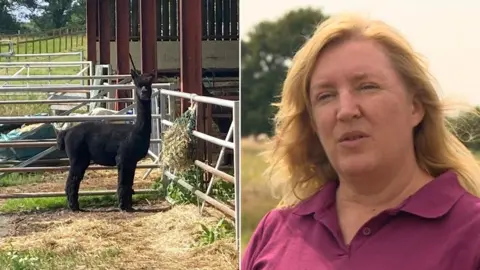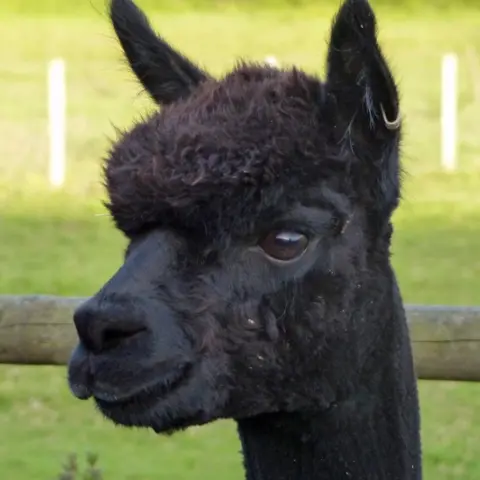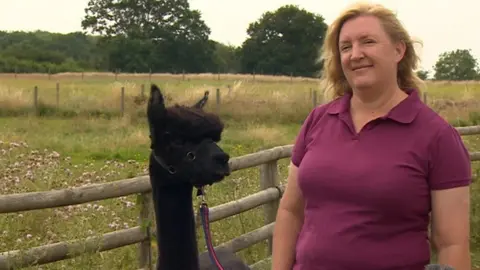Geronimo: Minister urged not to allow 'healthy' alpaca's death
 BBC
BBCThe owner of a condemned alpaca has urged the environment secretary not to allow the death of "a healthy animal in front of the whole world".
Geronimo was condemned to death by a High Court judge after twice testing positive for bovine tuberculosis (bTB).
Owner Helen Macdonald disputes the results but Environment Secretary George Eustice said a "highly specific and reliable test" was used.
More than 80,000 have signed a petition asking the prime minister to step in.
The 50-year-old veterinary nurse, who breeds the species at her farm in Wickwar, south Gloucestershire, has been locked in a legal battle with the Department for Environment, Food and Rural Affairs (Defra) since 2017.
She has repeatedly appealed to Prime Minister Boris Johnson and Mr Eustice to halt the destruction order, which she claims was based on inaccurate testing.
 Helen Macdonald
Helen MacdonaldSpeaking publicly on the issue for the first time on Thursday, Mr Eustice said Geronimo had "tested positive twice using a highly specific and reliable test".
"I have looked at this case several times over the last three years and gone through all of the evidence with the chief vet and other experts in detail," he said.

What is bovine tuberculosis?
- Bovine TB is a chronic, infectious disease caused by a slow-growing bacterium, Mycobacterium bovis
- All mammals, including humans, are susceptible to bovine TB
- Infection is mainly through inhalation or ingestion of bacteria
- Transmission can occur via nose to nose contact and via contact with saliva, urine, faeces and milk
- The bacterium can remain viable in the environment from a few days to many months
Source: UK Government and TB Hub

"My own family have a pedigree herd of South Devon cattle and we have lost cows to TB, so I know how distressing it can be and have huge sympathy for farmers who suffer loss."
A second warrant to execute the alpaca came into effect on Thursday after a last-ditch High Court bid to save Geronimo failed.
Defra has 30 days to visit Ms Macdonald's farm and put him down, which means a contractor could legally force entry to her property and shoot Geronimo, she said.

Responding to Mr Eustice's statement, Ms Macdonald, said: "The testing has never been validated.
"If he's willing to kill a healthy animal in front of the whole world without testing him properly first, then it's a sorry state of affairs."
She said she had been put through "four years of abject hell" and it was "like talking to a brick wall".
"I don't want Geronimo's last moments to be of being caught by a man who will put a gun to his head before he's shot," she said.
"And I assure you - [Geronimo] hasn't got it. And the sad thing is, they'll realise that only when he's dead and they've carried out a post-mortem on him, and then it's too late."
Defra has defended its methods after it was revealed the tests have never been trialled for their accuracy in detecting bovine tuberculosis in alpacas, and that Geronimo had tested negative on four occasions in New Zealand.
Chief veterinary officer Christine Middlemiss said she was aware of the devastation that TB caused, but they needed to follow the scientific advice by culling animals that test positive to minimise the spread of "the biggest threat to animal health in this country".
"The tests used on Geronimo were developed for use on alpacas and are highly specific - the chances of a false positive are significantly less than one per cent and we have tested him twice.
"Not just for the benefit of our farming industry but to avoid more TB cases in humans, our disease control measures must be applied," she added.

How has Geronimo been tested so far?
- Geronimo the alpaca has been tested twice with the Enferplex blood test, says Defra
- The UK government says this is the same test used on "a prize bull"
- Owner Helen Macdonald says there is insufficient evidence as to the accuracy of this relatively new test when used on alpacas
- Defra says Enferplex has a 0.34% chance of showing a false positive

Follow BBC West on Facebook, Twitter and Instagram. Send your story ideas to: [email protected]
